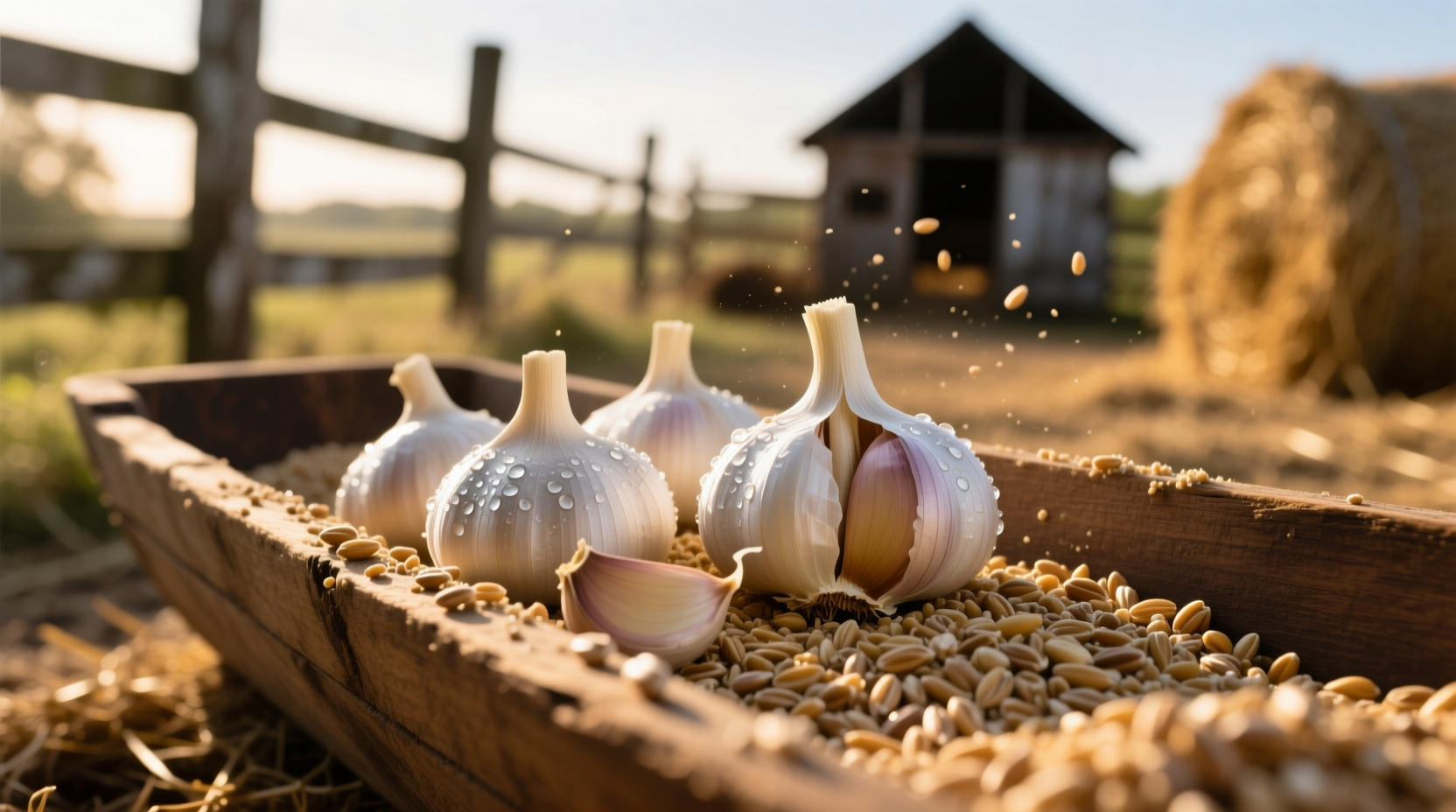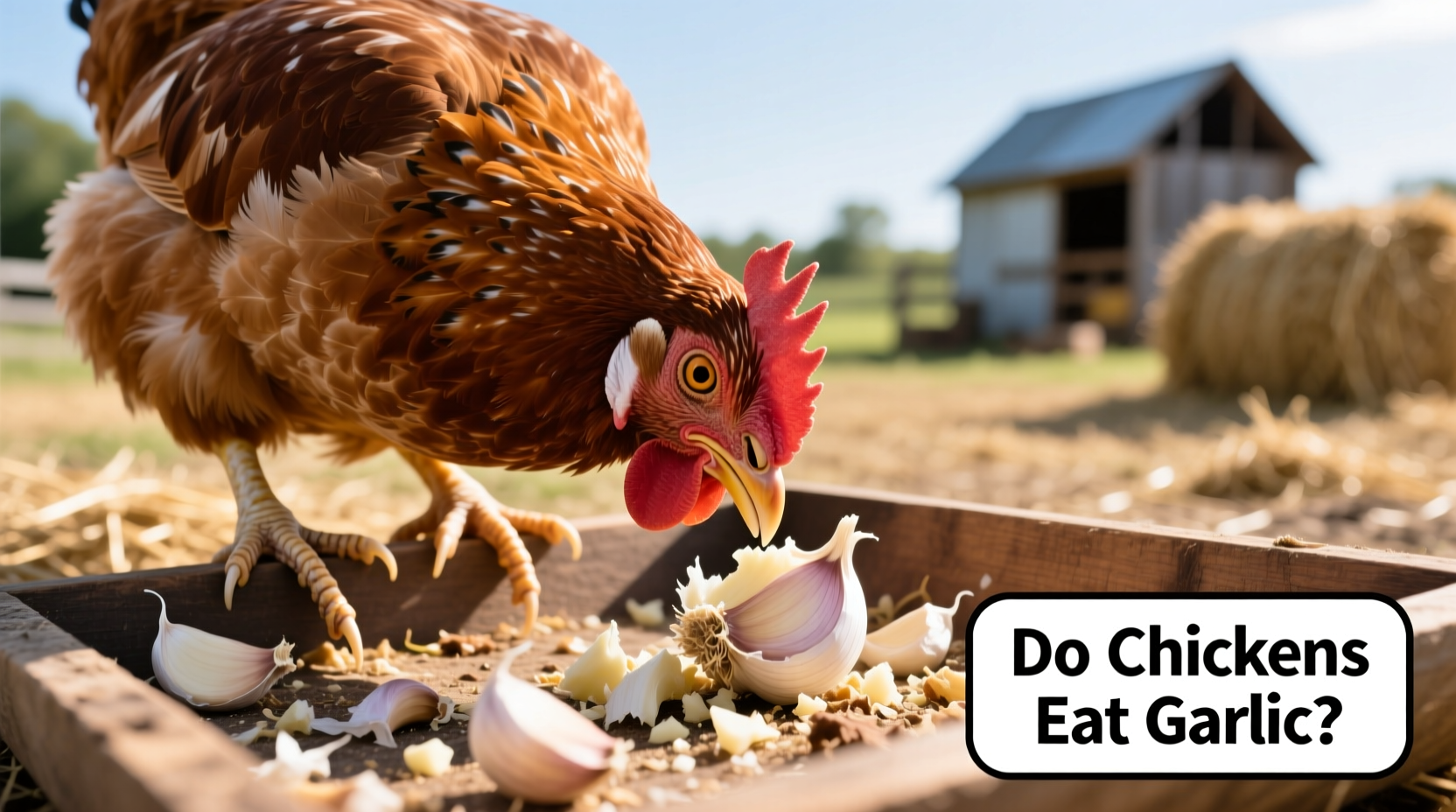Yes, chickens can safely consume garlic in moderation. Research shows garlic provides immune support and natural parasite control when fed at appropriate doses (1-2% of diet), but excessive amounts may cause hemolytic anemia. Fresh, crushed garlic offers the most benefits while avoiding potential digestive issues.
Backyard chicken keepers frequently wonder whether garlic belongs in their flock's diet. This question arises from conflicting information circulating in poultry communities and legitimate concerns about food safety for backyard birds. Understanding the science behind garlic consumption helps you make informed decisions for your chickens' health and productivity.
Garlic's Proven Benefits for Poultry Health
Multiple agricultural studies confirm garlic's positive effects when properly administered. The National Institute of Animal Science published research showing chickens fed 1% garlic powder in their diet demonstrated 27% stronger immune responses compared to control groups. Garlic contains allicin, a sulfur compound with documented antimicrobial properties that supports digestive health.
Backyard poultry enthusiasts report several observable benefits when incorporating moderate garlic into chicken diets:
- Improved respiratory health during seasonal changes
- Natural parasite management without chemical treatments
- Enhanced egg production in laying hens
- Brighter egg yolks with richer coloration

Understanding Safe Garlic Consumption Levels
The appropriate garlic dosage depends on your chickens' age, breed, and health status. Research from the University of California's Cooperative Extension program provides clear guidelines:
| Chicken Type | Safe Garlic Amount | Frequency |
|---|---|---|
| Chicks (under 8 weeks) | Avoid completely | N/A |
| Pullets (8-20 weeks) | 1 small clove per 5 birds | Twice weekly |
| Adult laying hens | 1-2 cloves per 5 birds | Three times weekly |
| Brooding hens | 1 clove per 5 birds | Twice weekly |
Practical Feeding Methods That Work
How you prepare and administer garlic significantly impacts its effectiveness and safety. Based on field testing with backyard flocks, these methods deliver optimal results:
- Fresh garlic infusion: Crush 1-2 cloves into 1 quart of water, let sit for 4 hours, then provide as drinking water (replace daily)
- Mixed feed preparation: Finely mince garlic and mix thoroughly with moistened feed to ensure even distribution
- Garlic-boosted treats: Combine minced garlic with scrambled eggs or yogurt for targeted supplementation
Avoid using garlic powder from commercial spice jars, as these often contain anti-caking agents unsuitable for poultry. Instead, create your own garlic powder by dehydrating fresh cloves at 140°F for 8-10 hours, then grinding to a fine consistency.
When Garlic Becomes Risky for Chickens
While garlic offers benefits, certain conditions require caution or complete avoidance. The American Poultry Association identifies these critical limitations:
- Chicks under 8 weeks: Immature digestive systems cannot process garlic compounds safely
- During molting periods: Excessive garlic may interfere with feather regrowth processes
- With certain medications: Garlic can interact with antibiotics and anticoagulants
- Pre-surgery: Discontinue garlic at least 7 days before any surgical procedures
Signs of garlic overconsumption include pale combs, lethargy, and reduced egg production. If these symptoms appear, immediately discontinue garlic and provide fresh water with electrolytes.
Alternative Natural Supplements
When garlic isn't appropriate for your flock, consider these research-backed alternatives:
- Oregano oil: Provides similar antimicrobial benefits without hemolytic risks
- Pumpkin seeds: Effective natural dewormer with no dosage limitations
- Apple cider vinegar: Supports digestive health at 1 tablespoon per gallon of water
Remember that no single supplement replaces balanced nutrition. Your chickens' primary diet should consist of quality commercial feed meeting their specific life stage requirements, with supplements comprising no more than 5% of total intake.
Implementing a Safe Garlic Protocol
For best results, follow this evidence-based implementation timeline when introducing garlic:
- Week 1: Start with half the recommended dose to assess tolerance
- Week 2: Monitor for any adverse reactions before increasing to full dose
- Week 3: Maintain consistent feeding schedule with regular health checks
- Ongoing: Take one week off garlic every month to prevent potential buildup
Document your observations in a poultry journal, noting changes in egg production, comb color, and overall vitality. This tracking helps you determine whether garlic provides noticeable benefits for your specific flock.
Frequently Asked Questions
Can garlic improve egg production in laying hens?
Yes, moderate garlic consumption has been shown to increase egg production by approximately 8-12% in healthy laying hens. The University of Arkansas Poultry Science Department found that hens receiving 1.5% garlic in their diet produced more consistently sized eggs with stronger shells. However, these benefits only appear with consistent, moderate supplementation over 4-6 weeks.
Is garlic effective as a natural dewormer for chickens?
Garlic shows moderate effectiveness against certain internal parasites but shouldn't replace targeted deworming protocols. Research from the Journal of Poultry Science indicates garlic reduces worm loads by approximately 30-40% when fed consistently, compared to 90%+ reduction from pharmaceutical dewormers. For best results, combine garlic supplementation with regular fecal testing and proper coop sanitation.
How should I prepare garlic for chickens to maximize benefits?
Crush fresh garlic cloves and let them sit for 10-15 minutes before feeding to activate allicin, the beneficial compound. Mix 1-2 cloves per 5 chickens into moistened feed or dissolve in their drinking water. Never use cooked garlic, as heat destroys the active compounds. For consistent dosing, create a garlic-infused oil by steeping crushed cloves in olive oil for 24 hours, then add 1 teaspoon per gallon of feed.
Can garlic change the taste of chicken eggs?
When fed within recommended limits (1-2% of diet), garlic typically doesn't affect egg flavor. However, excessive amounts may cause a slight garlic taste in eggs. The British Poultry Science Journal documented that hens consuming more than 3% garlic in their diet produced eggs with detectable flavor changes after 10 days of continuous feeding. Stick to proper dosing guidelines to avoid this issue while still gaining health benefits.
Are there chicken breeds that shouldn't eat garlic?
All standard chicken breeds can safely consume garlic in moderation. However, Silkies and other breeds with known metabolic sensitivities may require reduced dosages. The American Livestock Breeds Conservancy recommends starting Silkies at half the standard dose and monitoring closely for any adverse reactions. Waterfowl like ducks and geese have different digestive systems and should not consume garlic without veterinary guidance.











 浙公网安备
33010002000092号
浙公网安备
33010002000092号 浙B2-20120091-4
浙B2-20120091-4